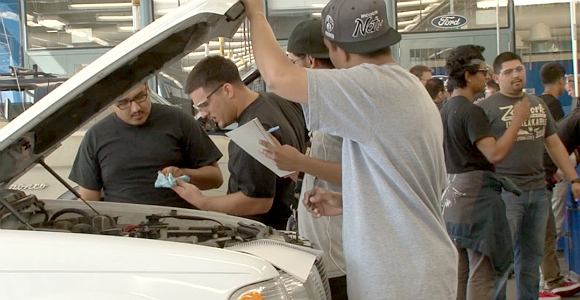
Automotive repair class at Cerritos College. (Photo Credit: John Guenther)
This week President Obama signed the Workforce Innovation and Opportunity Act, which reauthorizes the Workforce Investment Act to focus on improvements in publicly-funded employment and job training programs. That’s big news to Californians running career technical education programs, like automotive repair.
“What a huge shot in the arm,” said Mary Kemnitz, president of the Automotive Service Councils of California, which represents more than 1,000 independent automotive repair shops statewide. As owner of D&H Enterprises in Concord, Kemnitz said she cannot find enough qualified automotive technicians to fill job vacancies in her shop.
“I think a large part of it is because vocational education has been done away with in the last ten years and kids aren’t being routed in that direction,” said Kemnitz.
According to the U.S. Bureau of Labor Statistics, the job market for automotive technicians and mechanics is expected to grow nine percent in the next eight years. But according to Cerritos College Automotive Technology instructor Joe Mulleary, the market may grow faster than expected.
“There is a shortage of young technicians entering the workforce and there are still a lot of senior, veteran technicians working,” said Mulleary, adding that the average age of GM technicians is 48-years-old. ”And it [the workforce] is continuing to age and there aren’t enough young students coming in.”
Mulleary’s air conditioning class ends at midday, so many of his students can get to their jobs as auto technicians. Some of these students are sponsored by the local Ford, GM and Chrysler dealerships. They attend automotive classes at Cerritos College, where they learn how to work on specific makes of cars to the manufacturer’s specifications. When not in class, they work at the dealerships as technicians, thus ensuring a full-time job when they graduate.
Twenty-year-old Frank Bennie drives from Victorville to Cerritos College because it was the closest college to offer the GM Automotive Service Educational Program (ASEP). He said, “I wanted to come here, but I wanted to be sponsored. So I went from dealer to dealer.”
Bennie eventually found a sponsor in Genier GMC in his hometown. So, he drives the 90 miles each way to take classes as well as puts in four hours at the dealership. It will be worth it because, when he graduates, he’ll have his associate degree, state certification and a full-time job.
A quarter of the technicians at Harbor Chevrolet are GM ASEP graduates. Service manager Ed Martell said, of the 12 automotive technicians at his dealership, three are ASEP graduates.
“We’re running four students through that program as we speak,” said Martell. “And we have some good, talented individuals that we’re very encouraged about and the reason I found them was my involvement with the ASEP Program.”
It’s a win-win situation for the sponsored student and the dealership. But independent automotive shops still have to bear the burden on their own. Kemnitz said her best technicians are the ones her shop trains without the deep pockets of the dealerships. But, even with programs such as GM ASEP, the budget is still tight at Cerritos College’s Automotive Technology department. Mulleary pointed to the fact that classes are routinely cut due to lack of funding, which means fewer students will be able to learn the skills needed to obtain good-paying middle class jobs.
Things are looking up as the 2014-2015 state budget includes $50 million for career technical education, acknowledging the high costs of these programs and adopting a new “shared investment” funding advocated by the Workforce Action Team of the California Economic Summit. The funds will be allocated to regions to further distribution, instead of diffusing them among all the community colleges.
And Kemnitz is encouraged by the signing of the new federal law and the work of the Career Technical Education Pathways Program, a state program that helps high schools and community colleges collaborate to develop better technical education. In fact, state lawmakers included $250 million in the budget for the Career Pathways Trust for a work-based learning grant program, which was also supported by the Summit.
With optimism Kemnitz added, “Maybe in five years, life will be easier.”

